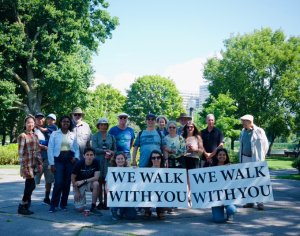Mental Health has a broad and socially woven meaning depending upon where you sit. I work with people who have needed extended support to address and manage the disability of a mental illness. These are people who in their personal history need the most intensive levels of support from hospitals or community-based levels of mental health care.
This form and intensity of service is from a particular view and while vital to contribute to any appreciation of a whole population approach to mental health, its position on the continuum of care can skew our view of population-based mental health wellness. Especially with our legacy of institutionalization which to this day haunts my everyday practice along with the legacy of a poorly managed de-institutionalization process. At the same time, there are significant service changes in play.
This change is occurring across care disciplines as well as at academic research and professional levels. The Canadian Mental Health Association’s Framework for Support of a few decades ago led by former Centre for Addiction and Mental Health social worker John Trainor, does a very good job of depicting the complex dynamic.

(Image by Canadian Mental Health Association (CMHA) Peel-Dufferin)
See the Framework here: https://cmha.ca/documents/a-framework-for-support
Social Work’s ethics, values and knowledge base bring critical pillars to community-based care and recovery practices. The bio/psycho/social practice of care which every psychiatric service posits as its framework of care continues to be the central focus. Yet, it has countless competing interests and problems in its implementation across the institutional and community systems of care encountered by clients, families and practitioners.
In 2005, the Canadian Association of Social Workers (CASW) provided a Summary of Core Social Work Values and Principles relevant to community practice in mental health. https://www.casw-acts.ca/en/Code-of-Ethics%20and%20Scope%20of%20Practice
They are the following:
Value 1: Respect for the Inherent Dignity and Worth of Persons
diversity, oppression and privilege; informed consent, client decision making, client rights and responsibilities
Value 2: Pursuit of Social Justice:
social determinants of health, income distribution, discrimination, marginalization, policy and social/organizational structures, antiracism
Value 3: Service to Humanity
use of power and authority, knowledge and skills, development of a just society, assessment and intervention techniques/approaches (individual, group, social), international linkages
Value 4: Integrity in Professional Practice
professional practice and integrity, promoting values of the profession within organizations, neutral/non-neutral use of self in professional comportment
Value 5: Confidentiality in Professional Practice
informed consent, transparency of process
Value 6: Competence in Professional Practice
ongoing research and knowledge development for the profession, individual continuing competency, schools of social work.
My everyday practice covers long-term involvement with clients to advance community inclusion. Ronald Labonté of the Globalization and Health Equity Research Unit (http://www.globalhealthequity.ca/) of the University of Ottawa Institute of Population Health examines the concept of client empowerment when providing care in Health Promotion and Empowerment: Practice Frameworks (1993). He makes an important point in the context of “empowerment” where both client citizenship and support for personal agency through the community development process are occurring along with the clients themselves needing both direct service and care. He notes:
“The two pillars that allow service delivery to be empowering are, first, that is offered in a supportive, non-controlling way and, second, that is not the limit of the resources offered by the agency. The combination of these two pillars has been referred to as “developmental casework.” In contrast to more traditional forms of casework or case management, “developmental casework is developmental, with an explicit goal the development (empowerment) of the individual receiving the support, and the creation of links between these individuals.” This approach builds towards community organizing and coalition advocacy – and hence the political elements of empowerment at the structural level remain explicitly…people have the right, here and now, to support in the face of difficulties… “ (p. 61)
LabonteHealthPromotionandEmpowermentReport (1)
In social work, the well-known practice wisdom is that our moral distress and/or burnouts are more often about the politics of systems rather than the people we serve. A useful resource for my own impatience was developed in Great Britain to support practitioners in addressing social inclusion and stigma via a personal competence guide: Capabilities for Inclusive Practice (2007).
Click to access capabilitiesforinclusivepractice.pdf
The social inclusion capability framework comprises:
ESC1 Working in partnership
ESC2 Respecting diversity
ESC3 Practicing ethically
ESC4 Challenging inequality
ESC5 Promoting recovery
ESC6 Identifying people’s needs and strengths
ESC7 Providing service user-centred care
ESC8 Making a difference
ESC9 Promoting safety and positive risk taking
ESC10 Personal development and learning
In psychiatric care, control and self-control are critical aspects of care. The idea of Citizenship remains a historical and current area of practice focus. John Sylvestre of the Centre for Research on Educational and Community Services (CRECS) (https://crecs.uottawa.ca/) suggests in his book, Housing, Citizenship, and Communities for People with Serious Mental Illness, in the chapter entitled, “The contributions of the concept of citizenship to housing practice, policy and research,” that:
1) legal citizenship – individual in a political community,
2)normative citizenship – civic or social organizations, and
3) lived citizenship – daily life, need to be integrated. Lived citizenship has challenges social workers face every day, with focus on the threats to a client’s personal agency and rights within their community. (https://global.oup.com/academic/product/housing-citizenship-andcommunities-for-people-with-serious-mentalillness-9780190265601?cc=ca&lang=en&)

The four aspects of practice outlined: 1) Framework for Support, 2) Social Work Values and Principles, 3) Client Empowerment, and 4) Citizenship are centrally linked to the organizations and systems of governance involved in mental health practice. The social work role in practice and service improvement involves engaging within our organizations and community networks with implementation practices, research, governance and accountability in order to be able to integrate the “bits” of our micro, mezzo, and macro practice.
Bill Dare wrote this article for the Eastern OASW Bulletin’s spring 2018 newsletter focused on the theme of mental health.









